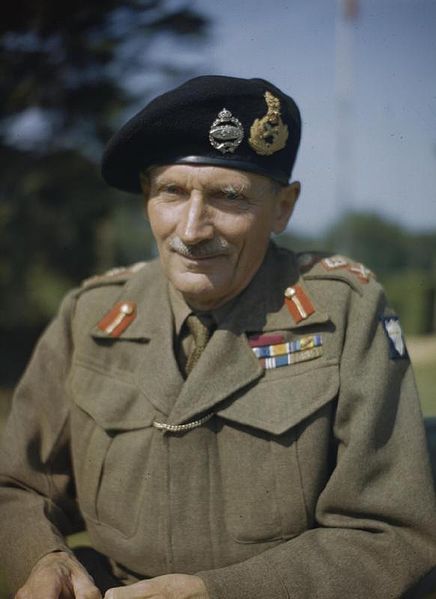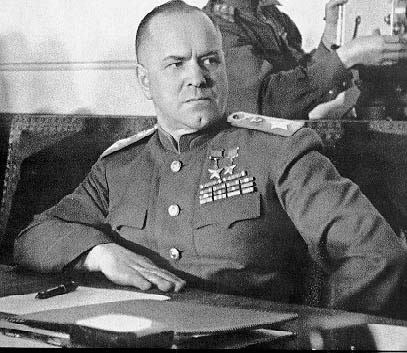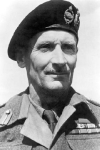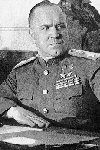Men of Destiny Who Govern Occupied Germany
The War Illustrated, Volume 9, No. 210, Page 139, July 6, 1945.
At Marshal Zhukov's headquarters on the outskirts of Berlin on June 5, 1945, there was signed by the four Allied commanders-in-chief an historic agreement for the future government of every phase of German life, in four zones of occupation. How these tasks, of enormous complexity are being pursued is told by JOHN ALLEN GRAYDON.
Stripped of her ill-gotten conquests, Germany has had her frontiers provisionally fixed as those existing on December 31, 1937. And in the absence of a central government of authority in Germany capable of accepting responsibility for the maintenance of order, the administration of the country and compliance with the requirements of the victorious Powers, the Governments of the U.K., the U.S.A., the U.S.S.R., and the Provisional Government of the French Republic formally assumed that authority on June 5, 1945.
This was signalized by the signing of an agreement by the four allied commanders-in-chief: Field-Marshal Montgomery, General Eisenhower, Marshal Zhukov and General de Lattre de Tassigny. As governors of the post-war Germany, their zones of occupation and authority were for the time being fixed as Eastern Germany for the Russians, North-Western for the British, Southern for the U.S., and extreme South-Western for France.
The first meeting was too brief for these points to be settled, but within a few hours Russia made it known the she wished to occupy about 50 per cent of the Reich's total area. If this were agreed upon, it would necessitate a withdrawal by Americans of over 150 miles to the west from parts of Saxony an Thuringia, and of about 60 miles in Central Germany. A comparatively small British withdrawal would be mainly from the Wismar area, where our 2nd Army met the Russians; Lübeck, Hamburg and the Kiel Canal would remain under British control.
The Governments of the Four Powers announced it to be their intention to consult with the Governments of the other United Nations in connexion with the exercise of this authority; and if smaller Allies assisted in the occupation by sending contingents of troops these would be under the control of the C.-in-C, of the zone.
Administration of the Greater Berlin area is to operate under the general direction of a Control Council consisting of the four Commandants, each to serve in rotation as Chief Commandant. In these tasks each is assisted by a highly qualified staff.
Offices of Grave Responsibility
To ensure that all German authorities and the German people shall carry out unconditionally the requirements of the Allied representatives, the Control Council has under it a permanent co-ordinating committee, composed of one representative of each of the four Commanders-in-Chief, and a control staff organized in the following divisions: military; naval; air; transport; political; economic; finance; reparation; deliveries, and restitution; internal affairs and communication; legal; prisoners of war and displaced persons; manpower. There are four heads of each of these divisions, one designated by each Power.
These are offices of grave and tremendous responsibility, and as adviser on political matters Field-Marshal Montgomery has the services of Sir William Strang, K.C.M.G., C.B., M.B.E., whose experience in this sphere marked him as pre-eminently fitted for the position. As head of the Central Department in the Foreign Office, he went to Moscow in June 1939 for negotiations (which, unhappily, proved abortive) in connexion with a Mutual Assistance Pact with the Soviet Union. In October 1943 he accompanied Mr. Eden to a conference of Foreign Secretaries in the U.K., U.S.A. and the Soviet Union in Moscow. And in November 1943 he was appointed U.K. representative on the European Advisory Commission and given his knighthood.
Head of the British economic division is Sir Percy H. Mills, whose efforts are directed at seeing that Germany never again has the opportunity of harnessing her industrial machine to purposes of war. He knows German industry well, and is considered to be one of Britain's greatest experts on machine tools. In normal times managing director of a big Birmingham engineering firm, W. and T. Avery Ltd., he is performing his present onerous duties without payment.
Sir Percy Mills has had a striking career. He went to a council school at Stockton-on-Tees, won a scholarship and went to a local central school, the at 16 was apprenticed to a local engineering firm. Five years later he moved to the Midlands and concentrated on high-precision engineering. Early in the was, when there was threat of a serious bottle-neck in the vital machine tools industry, he was called in to put matters right. He broke the bottle-neck, and within a year was Director-General of Machine Tools and was knighted for his great services. His team of experts includes men skilled in various fields of industry—who know all there is to know of mining, food, agriculture and other activities of German industrial life.
Field-Marshal Montgomery's chief representative for control problems is Lieut.-General Sir Ronald Weeks. He served in the First Great War, and in the Second Great War as Director-General of Army Equipment and, since 1942, as Deputy Chief of the Imperial General Staff—the first Territorial Army officer ever to receive a Staff appointment. Many were surprised when a Territorial—a non-professional soldier—was given such an important post but it should be remembered that Gen. Weeks was a “terrier” as long ago as 1912 (he is now 54 years of age). A lover of hard work, he was at his post at the War Office at 9 o'clock every morning and invariably remained there until 8 in the evening. Even then his day was not complete, for he took home papers to be studied at his flat.
Son of a mining engineer, Sir Ronald Weeks wanted to follow that occupation, and for nearly a year he worked below ground, then began training as a research chemist with a firm of glass manufactures, later becoming a director of the firm. Now the destiny of Europe is partly in his hands.
Sir Ronald Ian Campbell, K.C.M.G., C.B., an Assistant Under-Secretary of State in the Foreign Office, also is on the European Advisory Commission, with the rank of ambassador. Entering the Foreign Office in 1914, he has served in Washington, Paris Brussels, Cairo and Belgrade.
Index
Previous article
Along the Terrible Trail that Led to Wewak
Last Japanese-held port on the mainland of British New Guinea, Wewak fell to the 6th Australian Division on May 19, 1945. Two-thirds of the 30,000 enemy troops defending it perished. The remainder had
Next article
Montgomery to the Germans
As British representative on the Allied Control Commission (Marshal Zhukov representing Russia; Gen. Eisenhower the U.S.; Gen. de Lattre de Tassigny, France) Field-Marshal Sir Bernard Montgomery,







